Key takeaways:
- Proactive legal planning and regular compliance checks can prevent significant issues and enhance security in navigating legal obligations.
- Documenting agreements and seeking legal advice are crucial to avoiding common mistakes that can lead to costly ramifications.
- Learning from real case studies reinforces the importance of vigilance and sharing experiences to foster a supportive community and prevent future pitfalls.
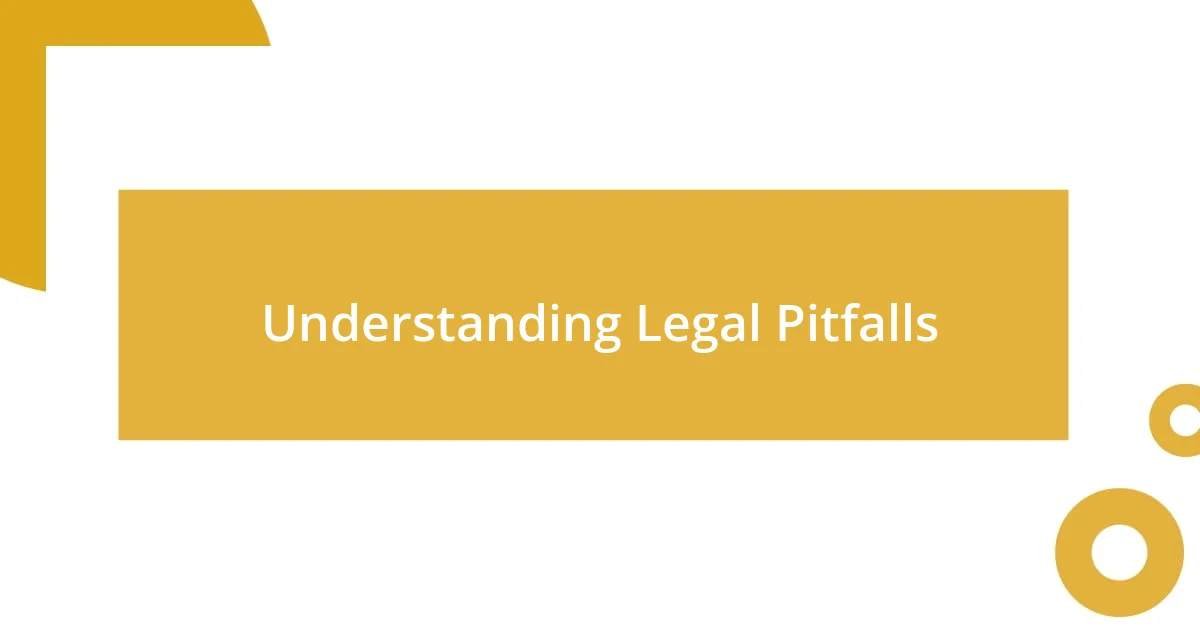
Understanding Legal Pitfalls
Legal pitfalls are often insidious, creeping up when you least expect them. I remember a time early in my career when I overlooked a seemingly minor compliance issue, only to be blindsided by hefty fines later. It got me thinking—how many of us are unaware of the traps that can derail our plans?
These pitfalls can take many forms, from contractual misunderstandings to regulatory violations. One time, I was in a rush to finalize a contract and skipped a thorough review. It wasn’t until a dispute arose that I realized I had missed crucial clauses. Isn’t it strange how a tiny oversight can evolve into a major setback?
Understanding these dangers requires vigilance and a proactive mindset. Have you ever paused to consider whether you truly understand the terms you’re agreeing to? I now approach every agreement with caution, knowing that even the smallest details hold significant power.
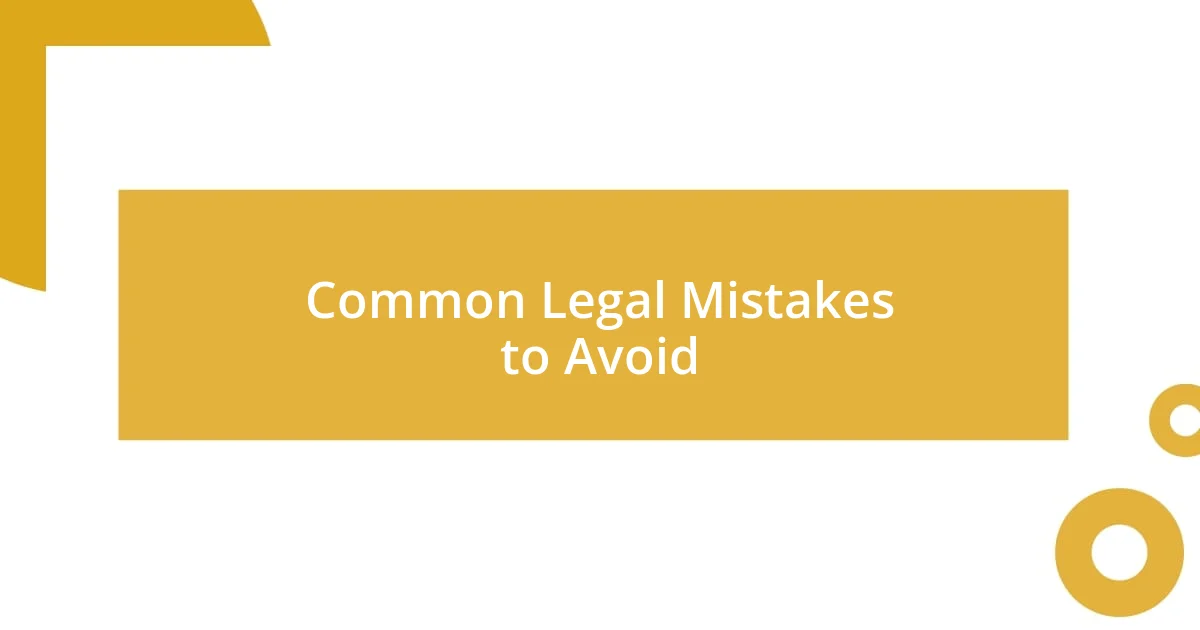
Common Legal Mistakes to Avoid
When navigating the legal landscape, one of the most common mistakes I’ve encountered is neglecting to document everything. Early on, I made verbal agreements, believing that trust was enough. It turned out that without written records, I was left with only my memory, which wasn’t sufficient when disputes arose. Trust matters, but without documentation, it can vanish in a puff of smoke.
Another pitfall is procrastination, especially when it comes to deadlines such as filing paperwork or responding to legal claims. I’ve felt that itch to push things off, thinking I would get to them later—only to face consequences I hadn’t anticipated. It’s like ignoring a leaky faucet; at first, it seems manageable until water damage starts to show. I learned the hard way that timely action can save not just money but also my peace of mind.
Lastly, I’ve observed that many underestimate the importance of seeking legal advice. Initially, I thought DIY legal work looked easy and cost-effective. However, I soon realized that small mistakes often snowball into larger issues I had to spend even more time and money to unravel. If you think a lawyer’s advice is an unnecessary expense, remember that the cost of rectifying a legal mistake can be far greater.
| Common Legal Mistakes | Impact |
|---|---|
| Neglecting Documentation | Leads to disputes and reliance on memory |
| Procrastination on Deadlines | Can result in missed opportunities and penalties |
| Underestimating Legal Advice | DIY mistakes can lead to costly repercussions |
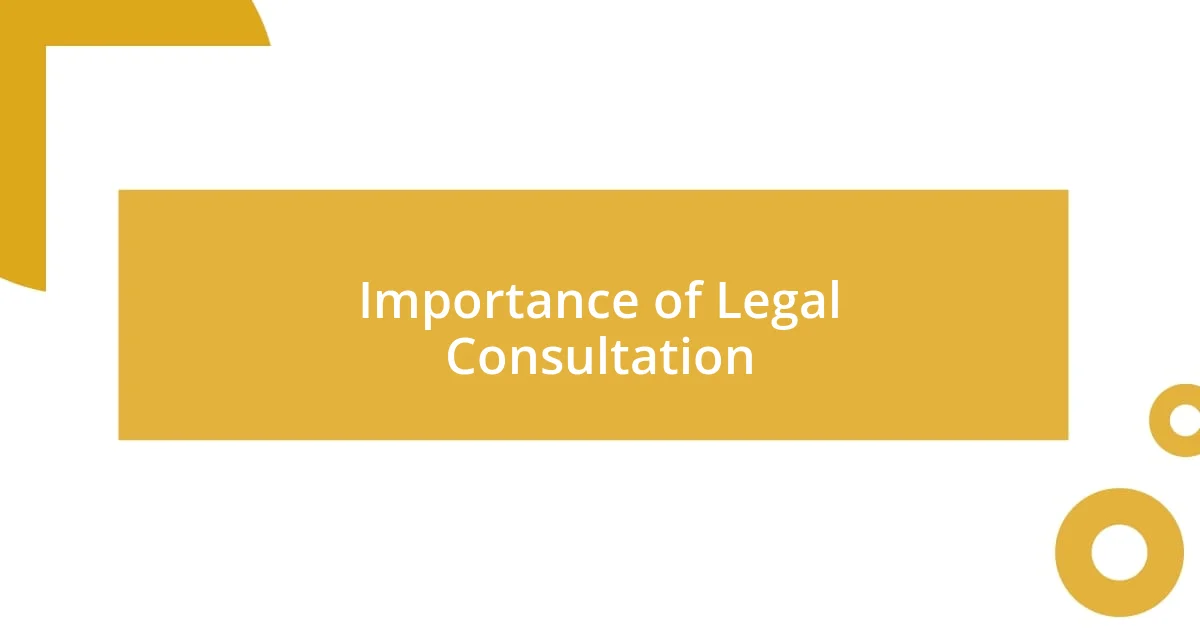
Importance of Legal Consultation
Engaging a lawyer for consultation can feel like a daunting step, especially when budgets are tight. I vividly remember hesitating before my first consultation, thinking it would be an expense I could skip. However, the clarity and peace of mind I gained from that session were invaluable. It was as if a fog had lifted, revealing paths I hadn’t considered before. A legal expert can identify potential challenges before they escalate, guiding your decisions with foresight.
Here are some key benefits of seeking legal consultation:
- Preventative Insight: Lawyers can spot issues before they become critical, like watching for cracks before a dam bursts.
- Strategic Guidance: They can provide tailored strategies based on your unique situation, turning confusion into confidence.
- Legal Compliance: Keeping you updated on ever-changing laws helps you adhere to regulations, minimizing the risk of fines.
- Objective Perspective: An attorney offers a third-party viewpoint that can help you make more informed decisions without emotional bias.
Reflecting on these factors, I’ve learned that a little foresight through legal consultation can prevent a lot of heartache down the road.
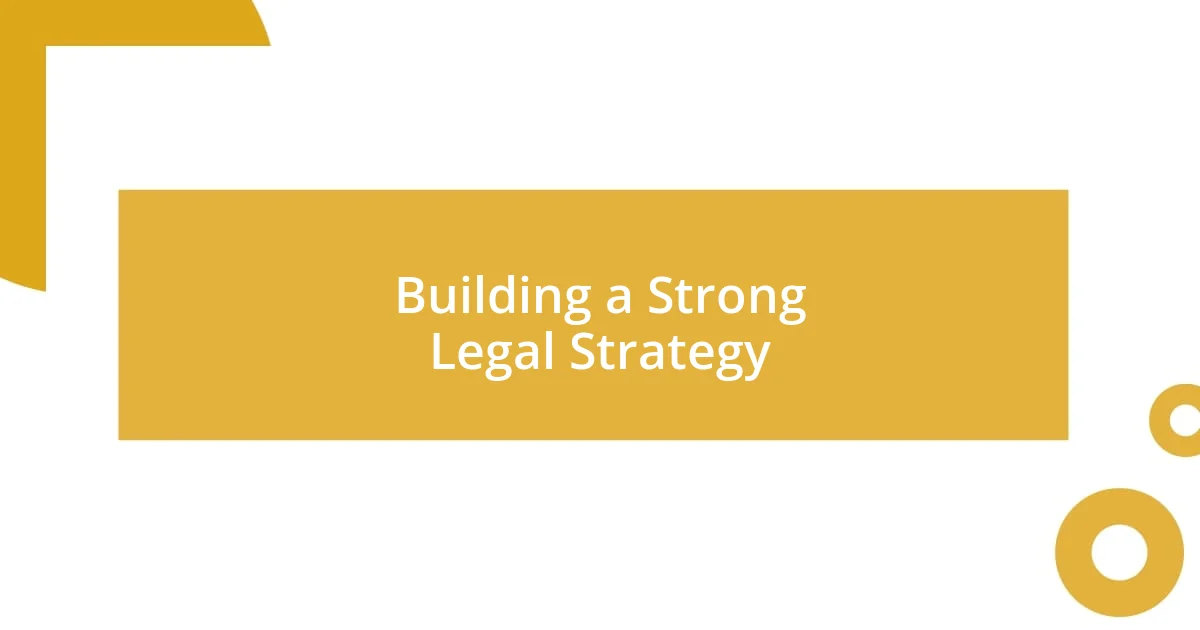
Building a Strong Legal Strategy
Building a strong legal strategy is pivotal for anyone looking to navigate the complexities of legal obligations. One aspect that transformed my approach was the realization that proactive planning can save a lot of stress later. I remember sitting down with a lawyer for a strategic session; it felt burdensome at first. But that hour of focused discussion opened my eyes to potential challenges I hadn’t even considered—like anticipating contract disputes before they happened. Knowing what lay ahead allowed me to make informed decisions instead of merely reacting.
Equally important is regularly reviewing and adjusting your strategy based on changes in your business or environment. I’ve found that what worked last year might not cut it today. A few months back, I noticed increased regulations affecting my industry, and I made it a priority to revisit my legal framework. It was a bit overwhelming to sift through new compliance requirements, but making those adjustments gave me confidence. Which brings me to a crucial question: are you consistently evaluating your legal strategy, or just coasting on what you’ve done before?
Finally, collaborating with a diverse team of legal professionals can enhance your strategy significantly. My experience has taught me that bouncing ideas around with experts from different fields—like intellectual property, employment law, and corporate governance—provides a more rounded approach. I remember a particular brainstorming session that not only gave me fresh insights but also identified blind spots I hadn’t noticed. It’s a powerful reminder that building a robust legal strategy isn’t a solo endeavor; it’s about leveraging collective expertise.
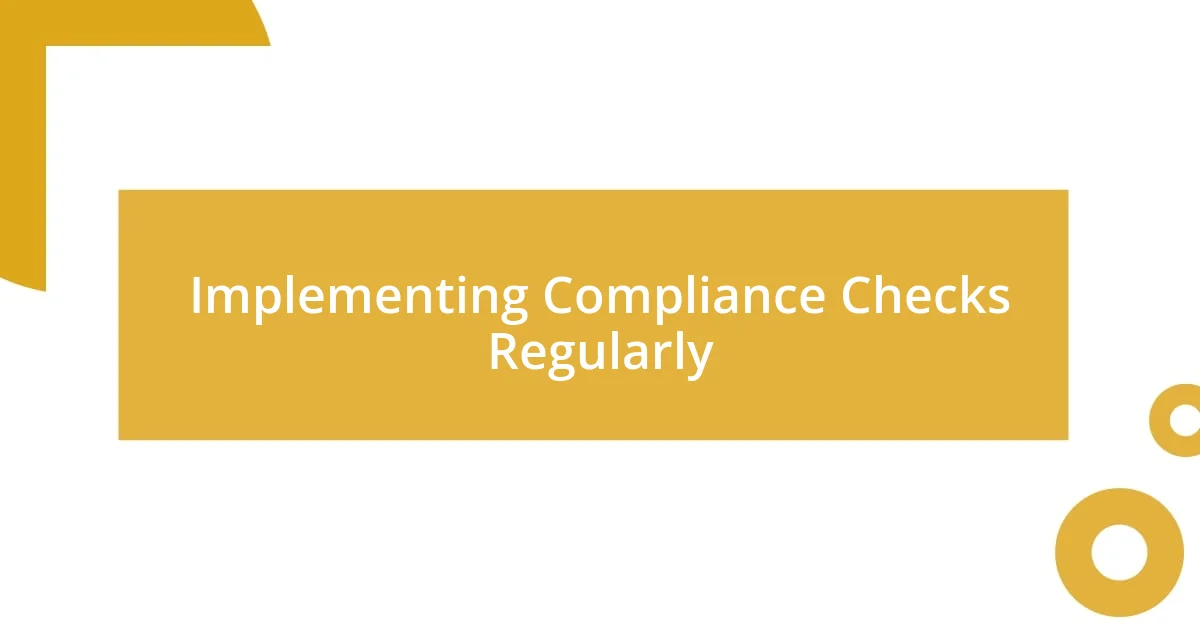
Implementing Compliance Checks Regularly
Implementing compliance checks regularly has been a game-changer in my journey to avoid legal pitfalls. I remember the anxiety I felt the first time I went through our compliance processes. It seemed tedious, even overwhelming. But as I settled into a routine, clarity began to unfold. I found that regular checks not only kept me informed but also made anyone involved feel more secure about our practices. It’s like cleaning out the garage—you never realize how cluttered it’s become until you start digging in!
I often ask myself, how often are we genuinely reviewing our compliance frameworks? A few months back, I scheduled bi-monthly compliance reviews with my team, and to my surprise, they became an engaging opportunity for dialogue. Everyone felt empowered, sharing insights and concerns that might have gone unnoticed. It was fascinating to see how a simple recalibration in how we approached compliance transformed our outlook. Compliance checks, when incorporated into our routine, don’t just serve as a necessary task; they evolve into a moment of collective awareness and proactive strategy.
Looking back, I can’t help but feel that those regular reviews saved us from potential issues down the line. There was this one particular instance when a new regulation was announced, and thanks to our recent compliance check, we were already prepared to adapt. Instead of scrambling, we tackled it head-on, which gave me a sense of control that I hadn’t felt before. Isn’t it reassuring to know that by committing to regular compliance checks, we can sidestep many headaches before they arise?
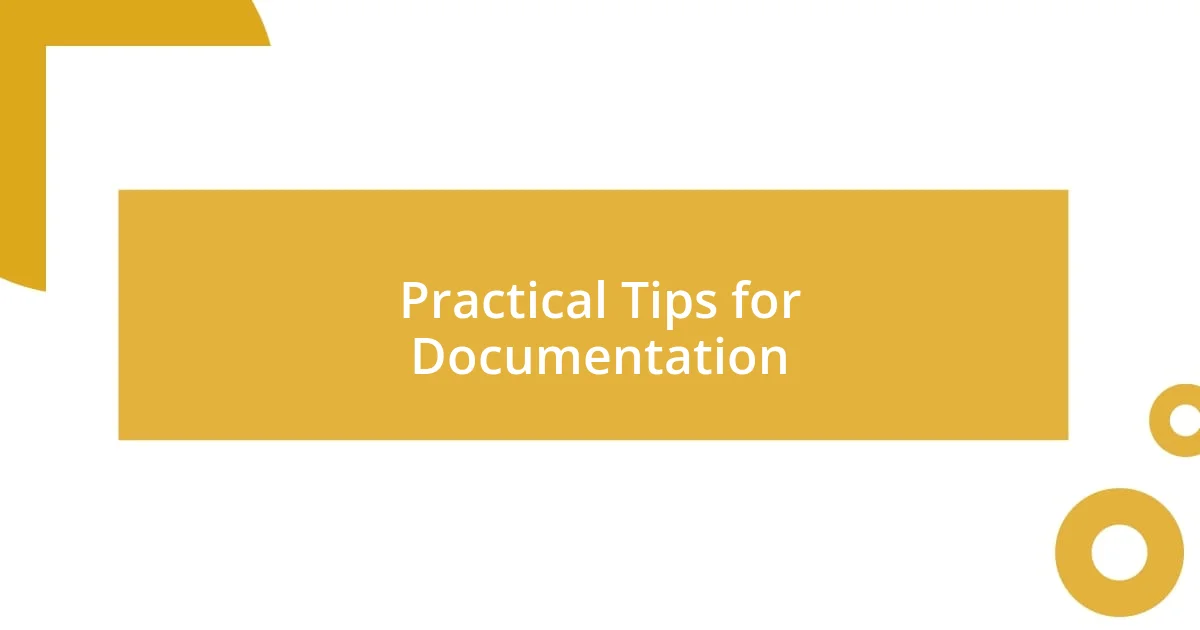
Practical Tips for Documentation
Keeping thorough documentation has proven invaluable in my quest to navigate legal pitfalls. I’ve learned the hard way that a well-organized paper trail can make all the difference in a dispute. I recall when I faced an unexpected challenge regarding a contract. Thankfully, I had meticulously kept all relevant communications and revisions, which not only clarified our intentions but also safeguarded my interests. It felt reassuring to unravel that complexity, and I often wonder how many others go unprotected simply due to disorganization.
I also emphasize the importance of digital documentation. In my experience, storing documents in cloud-based systems has enhanced accessibility and collaboration with my team. Just the other day, while preparing for a negotiation, I accessed previous meeting notes instantly, which helped me stay aligned with my objectives. It’s about being proactive, isn’t it? How often do we think about how technology could streamline our legal processes? I now can’t imagine managing everything without those digital tools at my fingertips.
Finally, don’t underestimate the power of clear labeling. I realized that a clear naming convention could save precious time when searching for specific files. When I renamed documents systematically, I felt a wave of relief wash over me during a recent audit. It transformed what could have been a chaotic search into a smooth, efficient process. I still ask myself: how much easier could our legal navigation become with just a little more attention to detail? The truth is, these practical steps empower us and can ultimately help us avoid legal pitfalls we didn’t even see coming.

Learning from Real Case Studies
When I think about learning from real case studies, I can’t help but reflect on a time when a company I was consulting for faced serious legal issues due to regulatory oversights. They had overlooked crucial industry standards, thinking they were compliant. Going through their case, I quickly realized how vital it is to dissect previous errors. It made me appreciate the importance of sharing these stories, as they put into perspective just how easily things can spiral out of control. Can you imagine the anxiety of seeing your work unravel due to avoidable mistakes?
One case that still stands out to me involved a small business owner who misinterpreted local zoning laws. This misstep not only stalled their expansion but also incited a hefty fine. As I delved deeper into their experience, I recognized the power of vigilance. This incident reinforced my belief that examining each case—from mistakes made to lessons learned—can pave the way for smarter decision-making. It’s a powerful reminder: when we analyze these real-life examples, we arm ourselves with insights that might prevent us from walking the same path. Are we truly learning from the experiences of those who came before us?
Reflecting on this topic, I often think about how sharing such experiences creates a community of support and awareness. I once attended a seminar where a legal expert discussed their experiences with compliance challenges. The stories shared opened my eyes to many pitfalls I hadn’t considered before, leading me to adopt new strategies. It’s amazing how hearing about real struggles instills a sense of camaraderie. Don’t you think there’s an undeniable strength in collective learning? When we openly discuss our challenges, we create opportunities for prevention and innovation in navigating the legal landscape.















